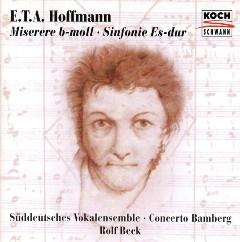E.T.A. Hoffmann – Miserere B-Moll-Sinfonie Es-Dur (1997)
E.T.A. Hoffmann – Miserere B-Moll-Sinfonie Es-Dur (1997)

Miserere B-Moll (Miserere In B Flat Minor) 1 Miserere Mei, Deus. Adagio 5:57 2 Ecce Enim. Andante Molto 3:06 3 Ecce Enim Veritatem. Andante Maestoso 2:40 4 Asperges Me. Larghetto 3:41 5 Auditui Meo Dabis. Andante 1:44 6 Averta Faciem Tuam. Adagio 3:22 7 Redde Mihi. Andante 3:45 8 Docebo Iniquos. Moderato 2:18 9 Libera Me. Adagio - Alla Breve 2:41 10 Sacrificim Deo. Larghetto Sostenuto 5:01 11 Benigne Fac. Adagio 1:59 12 Ut Aedificentur. Allegro 3:26 Sinfonie Es-Dur (Symphony In E Flat Major) 13 Adagio E Maestoso. Allegro 7:32 14 Andante Con Moto 6:39 15 Menuetto 2:52 16 Finale. Allegro Molto 4:10 Camilla Nylund (soprano) Arantxa Armentia (mezzo-soprano) Lioba Braun (alto) Rodrigo Orrego (tenor) Johannes Schmidt (bass) Concerto Bamberg Süddeutsches Vokalensemble Rolf Beck – conductor
It was ETA Hoffmann’s writings which so inspired Schumann and, rather differently, Offenbach. But Hoffmann (1776-1822) was a composer of note himself, graduating via occupied Poland to the German theatre and opera house, as evidenced by a clutch of stage works (notably Undine) which he added to the repertoire of his day. In Bamberg, Hoffmann left a durable mark, and in return these capable forces do him more than credit. Both works hold up well, though the youthful, spirited, Classical-style Symphony – played inspiredly, if just a little bass-heavy – is less fertile in ideas than the forty-minute choral work, where Hoffmann’s Mozartian fervour and keen grasp of earlier repertoire bear fruit. The Miserere, planned for a Catholic royal occasion, based on a reduced Psalm 50 and cast in some dozen sections, is an ideal textual vehicle for Hoffmann’s intelligent and imaginative word-setting. All the soloists do well, though early on the slightly operatic alto and tenor seem just a little portentous, and one quintet sounds earnest rather than penitential. The bass is clearest but weakest; the mezzo is most rewarding. Beck’s choir sings with genuine feeling, the adagios never get moribund and the orchestra’s ample bowing lends full body and a stately forward momentum. Woodwind obbligato and Baroque-style punctuating brass are strong, and the warm Koch acoustic enhances all. Latin and German texts only are given; the German notes are more instructive than the English. ---Roderic Dunnett, classical-music.com
download (mp3 @320 kbs):
yandex 4shared mega mediafire uloz.to cloudmailru gett








